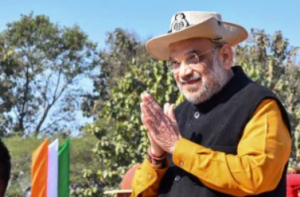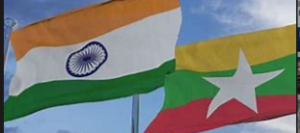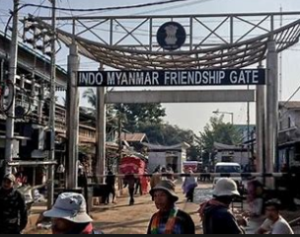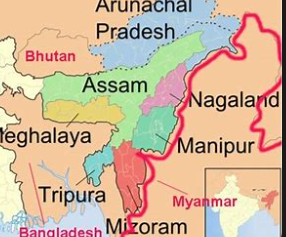In a significant development, India’s Home Minister, Amit Shah, has announced plans to tighten the India-Myanmar border to control free movement. This decision, made on January 20, 2024, comes amid rising concerns about illegal immigration, smuggling, and security threats. The announcement, made during the passing out parade of newly appointed Assam Police commandos, has sparked widespread discussions about its implications.

Amit Shah, India’s Home Minister, has expressed the government’s intent to fortify the India-Myanmar border, drawing parallels with the India-Bangladesh border security measures. This plan involves the introduction of fencing to limit unrestricted movement. The primary objective is to bolster border security and tackle challenges like illegal immigration and smuggling. This strategy embodies the government’s dedication to national security, while also considering the necessities and rights of the local communities residing along the border.
Myanmar
India shares a 1,643-km border with Myanmar, of which only 10 km is currently fenced. The Free Movement Regime (FMR) agreement with Myanmar, formalized in 2018, allows tribes living along the border to travel 16 km into the other country without a visa. However, the new measures will require anyone crossing the border to obtain a visa. This move is part of the government’s plan to revise the FMR, aiming to restrict easy cross-border movement.
Community Impact and Security Issues
The Free Movement Regime (FMR), established in 2018, was designed to regulate and harmonize the existing free movement rights of people living along the India-Myanmar border. It acknowledged the traditional fluidity of life along this border, aiming to enhance economic and social interaction between the two countries and protect the rights of tribal communities.
The Chin people of Myanmar’s Chin state, who share ethnicity with the Mizos and Kuki-Zomis of Manipur, live contiguously with Mizoram. There’s also a significant Naga population in Myanmar’s Sagaing region. These communities maintain close ties, fostering social and economic exchanges.
However, recent events have shifted the focus to security concerns. The aim is to curb illegal immigration, drug trafficking, gold smuggling, and prevent insurgent groups from misusing the FMR for attacks on India.
The fluidity of the India-Myanmar border was highlighted last year during the conflict in Manipur. The state government and Meitei civil society attributed the instability in the region to uncontrolled immigration of Chin people from Myanmar. In response, during his visit to Manipur, Shah announced that the Centre had begun the process to fence an additional 80 km of the border and initiated surveys along the remaining border.
The suggestion to strengthen the India-Myanmar border has stirred up discussions about how it might affect the relationship between the two nations. India and Myanmar have a rich shared heritage, encompassing cultural, economic, and strategic bonds. A major shift in border policies could influence these ties. It’s crucial for both nations to participate in open conversations to tackle shared issues and discover a balanced solution that ensures security while preserving amicable relations.
Mizoram, Nagaland’s Opposition; Manipur’s Security Drive

In response to the ongoing conflict, Manipur’s Chief Minister N Biren Singh, in September of the previous year, requested the Centre to abolish the Free Movement Regime (FMR). He cited the influx of illegal immigrants and cross-border trafficking as the reasons behind this request. The Manipur government has been actively advocating for the sealing of the India-Myanmar border.
Contrarily, the governments and civil societies in Mizoram and Nagaland have expressed their opposition to this move. After reports of the planned move surfaced, Mizoram’s Chief Minister Lalduhoma met with Prime Minister Narendra Modi and External Affairs Minister S Jaishankar in Delhi. Following the meeting, he told the media that the Mizos perceive the India-Myanmar border as an “imposed boundary” and deem its fencing as unacceptable. The Nagaland government has so far refrained from commenting on the matter. However, Deputy Chief Minister Y Patton met with Lalduhoma in Aizawl on January 8.
Following the meeting, the Mizoram government stated that Patton had communicated that the fencing of the border would be “unacceptable for Nagas”, considering the significant Naga population in Myanmar.
Shah’s Remarks: Governance and Pride
Shah highlighted a significant transformation in the country’s law and order over the past decade under PM Narendra Modi’s leadership. He criticized the Congress, claiming that during their rule, individuals had to resort to bribery to secure government jobs. In contrast, he asserted that under BJP’s governance, employment is granted without any illicit payments.
Speaking about the consecration ceremony in Ayodhya, Shah expressed that after 550 years of dishonor, Lord Ram would finally return home. He emphasized that this event, coinciding with India’s journey towards becoming a superpower, is a source of national pride.











